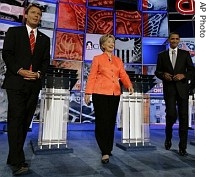2007年VOA标准英语-US Democratic Presidential Contenders Take Part(在线收听)
Washington
24 July 2007
The eight Democratic contenders for president in 2008 faced off in a debate Monday evening that featured an unusual format. The candidates faced questions from average citizens put to them on video through the video-sharing Web site known as YouTube. The event was televised on the Cable News Network. VOA national correspondent Jim Malone has more from Washington.
 |
| Democratic presidential hopefuls former Senator John Edwards (left), Senator Hillary Rodham Clinton (center), Senator Barack Obama (right), stand together before the start of a debate on CNN, 23 July 2007 |
On Iraq, Illinois Senator Barack Obama reminded viewers that he opposed the U.S. led invasion from the beginning, unlike Democratic frontrunner Hillary Clinton who initially supported the use of force against Saddam Hussein.
"The time for us to ask how we were going to get out of Iraq was before we went in, and that is something that too many of us failed to do," he said.
Clinton currently leads the Democratic field in public opinion polls, followed by Obama and former Senator John Edwards.
In response to another question, Obama said he would be willing to meet individually with the leaders of Iran, Syria, Venezuela, Cuba and North Korea in the first year of his presidency.
In contrast, Senator Clinton took a much more cautious approach to dealing with countries hostile to the United States.
"Because I think it is not that you promise a meeting at that high a level before you know what the intentions are," she said. "I do not want to be used for propaganda purposes."
Much of the debate featured citizens asking the candidates questions on video, including this woman whose son is about to return to duty as a soldier in Iraq.
"How many more soldiers must die while these political games continue in our government?" asked a woman.
New Mexico Governor Bill Richardson said he will pull all U.S. troops out of Iraq within six months. But several of the other contenders said it would take much longer to get the bulk of U.S. forces out of Iraq.
This is an exchange between a questioner and Senator Joe Biden of Delaware.
"Would you leave a newborn baby to take care of himself? How do we pull out now," asked one man.
"You know we cannot just pull out now. Let us get something straight. It is time to start telling the truth," Biden replied.
The candidates also differed on the question of whether U.S. troops should be sent into the Darfur region of Sudan to help quell the violence there. Senator Biden said yes while Senator Clinton said no.
The debate delved into domestic issues as well, including global warming, taxes and health care.
At one point, a lesbian couple appeared on screen with a question for all eight candidates.
"If you were elected president of the United States, would you allow us to be married," one of the women asked.
Most of the contenders said they would support allowing homosexual couples to enter into civil unions, a step short of gay marriage.
The debate was held amid the backdrop of recent public opinion polls that suggest Democrats have cause for optimism next year. A recent New York Times/CBS News survey found that voters preferred a Democrat to win the White House next year over a Republican by a margin of 47 to 32 percent.
But political analyst Stuart Rothenberg says the gap between the two parties closes rapidly once the names of specific candidates are mentioned.
"And it certainly is the case that a generic Democrat has a huge lead over a generic Republican," he noted. "But when you put Senator Clinton in the race against a particular Republican, or even when you put Senator Obama in the race against a particular Republican, it often tightens up. So, Democrats are optimistic and upbeat, but they know they cannot take anything for granted yet."
In all, 39 videos through YouTube were used in the debate to ask questions of the Democratic contenders.
A similar interactive debate is scheduled for September for the nine Republicans seeking their party's presidential nomination.